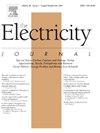不注意阴影下的定价:住宅太阳能电价产消不注意的信息论模型
IF 2.2
Q1 Social Sciences
引用次数: 0
摘要
由于分布式太阳能重塑了住宅电力市场的动态,传统的定价机制越来越受到实际行为现实的制约。这篇文章通过将生产消费者的注意力不集中(一个在主流模型中经常被忽略的因素)整合到一个基于信息论的统一定价框架中,从而推进了这一领域。利用香农熵来表示有限注意力,本文提出了一个广义模型,该模型评估了三种广泛使用的太阳能电价:上网电价(FIT)、净计量电价(Net M)和净购销电价(Net P&;S)的福利、产消效用和电力公司的盈利结果。研究结果在分析上是严谨的,并使用来自德克萨斯州的实际数据进行了实证验证,揭示了行为摩擦对关税绩效的重大影响。特别是在有限关注下,Net M和Net P&;S在社会福利方面优于FIT,而FIT为电气零售企业提供了更大的收入稳定性。这些见解是及时且与政策相关的,强调了将太阳能定价策略与实际用户行为相结合的必要性。对于监管机构、电力零售公司和学者来说,这项工作为将行为经济学纳入能源关税设计提供了令人信服的理由。这是实现公平、高效和有弹性的能源转型的必要步骤。本文章由计算机程序翻译,如有差异,请以英文原文为准。
Pricing in the shadows of inattention: An information-theoretic model of prosumer inattention in residential solar tariff
As distributed solar energy reshapes the dynamics of residential electricity markets, traditional pricing mechanisms are increasingly strained by behavioral realities on the ground. This article advances the field by integrating prosumer inattentiveness, a factor too often omitted from prevailing models, into a unified pricing framework grounded in information theory. Drawing on Shannon’s entropy to represent bounded attention, the paper present a generalized model that evaluates the welfare, prosumers’ utility and electric company’s profitability outcomes of three widely used solar tariffs: Feed-in Tariff (FIT), Net Metering (Net M), and Net Purchase and Sale (Net P&S). The findings are analytically rigorous and empirically validated using real-world data from Texas, revealing that behavioral frictions materially affect tariff performance. In particular, Net M and Net P&S outperform FIT in terms of social welfare under finite attention, while FIT offers greater revenue stability for electrical retail companies. These insights are timely and policy relevant, underscoring the imperative to align solar pricing strategies with actual user behavior. For regulators, electrical retail companies, and scholars alike, this work makes a compelling case for incorporating behavioral economics into energy tariff design. This is a necessary step toward achieving equitable, efficient, and resilient energy transitions.
求助全文
通过发布文献求助,成功后即可免费获取论文全文。
去求助
来源期刊

Electricity Journal
Business, Management and Accounting-Business and International Management
CiteScore
5.80
自引率
0.00%
发文量
95
审稿时长
31 days
期刊介绍:
The Electricity Journal is the leading journal in electric power policy. The journal deals primarily with fuel diversity and the energy mix needed for optimal energy market performance, and therefore covers the full spectrum of energy, from coal, nuclear, natural gas and oil, to renewable energy sources including hydro, solar, geothermal and wind power. Recently, the journal has been publishing in emerging areas including energy storage, microgrid strategies, dynamic pricing, cyber security, climate change, cap and trade, distributed generation, net metering, transmission and generation market dynamics. The Electricity Journal aims to bring together the most thoughtful and influential thinkers globally from across industry, practitioners, government, policymakers and academia. The Editorial Advisory Board is comprised of electric industry thought leaders who have served as regulators, consultants, litigators, and market advocates. Their collective experience helps ensure that the most relevant and thought-provoking issues are presented to our readers, and helps navigate the emerging shape and design of the electricity/energy industry.
 求助内容:
求助内容: 应助结果提醒方式:
应助结果提醒方式:


